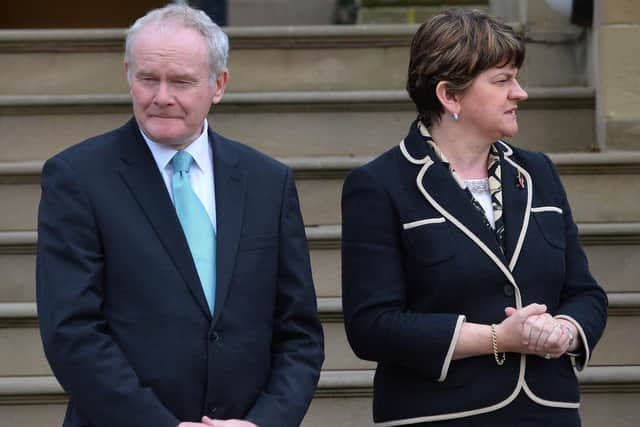Alex Kane: Northern Ireland’s hybrid status might, ultimately, help the Union


Not a single word.
The UK’s relationship with the EU – along with the right to terminate it – is an excepted power: the 1998 NI Act does not affect the power of the UK Parliament to make laws for Northern Ireland. Crucially, though, the act also says: ‘It is hereby declared that Northern Ireland in its entirety remains part of the United Kingdom and shall not cease to be so without the consent of a majority of the people of Northern Ireland voting in a poll held for the purposes of this section in accordance with Schedule 1.’
The ‘in its entirety’ matters. And it matters because the NI Protocol shifts NI from its orbit with GB and, by leaving it partly within the EU, means it is not an ‘entire’ part of the UK at the moment. That’s why unionists – and not just those who voted Remain – are angry. The GFA was worded in such a way that the rights of people to be recognised as Irish, British or both is acknowledged and respected. NI’s status within the UK – in its entirety – was also acknowledged and respected and underpinned with the guarantee (endorsed by referendums on both sides of the border) the status would not be altered without consent.


Advertisement
Hide AdAdvertisement
Hide AdDuring the 2016 referendum campaign it was understood there would probably have to be some sort of bespoke arrangement if Leave won. Given the particularly bespoke nature of the GFA (and who, in 1998, predicted the DUP/SF would cut another ‘ourselves alone’ bespoke deal in 2007) it seemed reasonable to conclude an arrangement could be reached. Albeit not one that upended a key guarantee of the GFA and fundamentally altered NI’s constitutional relationship with the rest of the UK – all done without consent.
Bizarrely, we have now ended up with four borders. GB and NI. GB and the EU. UK and RoI. NI and the RoI. Talk about complicating matters! This absurdity (a massive inconvenience to just about everyone) exists because it was declared that beefing up the existing land border would jeopardise the peace/political process: yet creating an entirely new border and altering the NI/GB relationship should just be greeted by unionism with a shrug of the shoulders.
In August 2016 Arlene Foster and Martin McGuinness wrote a joint letter to Theresa May which endorsed a bespoke arrangement (so much so that Steve Aiken accused Foster of a Brexit U-turn): ‘We have had constructive initial discussions with the Irish government and wish to play our part in the engagement between the two governments on the unique aspect of negotiations that arise from the border ... We wish to have full access to that intergovernmental process as the border issues affecting trade, employment, energy and potential criminality are of such high significance for us.’
So far, so good. The joint approach was welcomed by both governments and the Assembly parties. But, as we know, within five months the Assembly began a three-year hiatus (I wonder if a SF rethink on the possibilities raised by a problematic Brexit played a part in the collapse) and five months after that the DUP began an uber-unionist relationship with the ERG wing of the Conservative government (I wonder if the opportunity to sideline SF from negotiations played a part in its thinking).
Advertisement
Hide AdAdvertisement
Hide AdLet me say something to those who insist pro-Brexit unionists should “suck it up” and take ownership of their decisions. I own my votes. I backed the GFA, but I didn’t vote for the mostly horrendous mess it became. I backed Leave, but didn’t anticipate the Remain battle in the Commons and the meltdown of the Conservatives.
I knew there was a land border/GFA dynamic to Leave, but I reckoned it could be sorted. It’s what Foster/McGuinness and others thought, too. I did not vote for a ‘new’ border which would leave NI in the EU. I was never asked for my consent. And I didn’t hear a single person (feel free to write to the paper if you have evidence to the contrary) on the Remain side, anywhere, suggest, during the referendum campaign, such an outcome was obvious.
I acknowledged there were challenges to the Union: as there were in 1972, 1985, 1993 and 1998. But the constitutional guarantee ensured the Union couldn’t end without a majority vote to end it. I acknowledged there would be administrative problems, but none that couldn’t be resolved reasonably quickly. Incidentally, I think that remains the case right now: it is not in the interests of the UK/EU/RoI to prolong or exacerbate a situation which could lead to major instability and tension.
What I didn’t foresee – and yes, I ‘own’ the error – was that it would be a UK government which would push NI into what I describe as a granny flat status. It doesn’t mean the end of the Union (indeed, maybe the hybrid status will actually help), but it does make life a little more difficult for the pro-Union lobby. Which is why it is concerned: concerns which should be understood by those who ruled out a so-called ‘hard’ border between North and South.
Advertisement
Hide AdAdvertisement
Hide AdI understand why the DUP shoulders a lot of blame: and deservedly so. But there would still have been a problem if Leave had won, yet every voter in NI had voted Remain.
——— ———
A message from the Editor:
Thank you for reading this story on our website. While I have your attention, I also have an important request to make of you.
With the coronavirus lockdown having a major impact on many of our advertisers — and consequently the revenue we receive — we are more reliant than ever on you taking out a digital subscription.
Subscribe to newsletter.co.uk and enjoy unlimited access to the best Northern Ireland and UK news and information online and on our app. With a digital subscription, you can read more than 5 articles, see fewer ads, enjoy faster load times, and get access to exclusive newsletters and content. Visit https://www.newsletter.co.uk/subscriptions now to sign up.
Advertisement
Hide AdAdvertisement
Hide AdOur journalism costs money and we rely on advertising, print and digital revenues to help to support them. By supporting us, we are able to support you in providing trusted, fact-checked content for this website.
Alistair Bushe
Editor